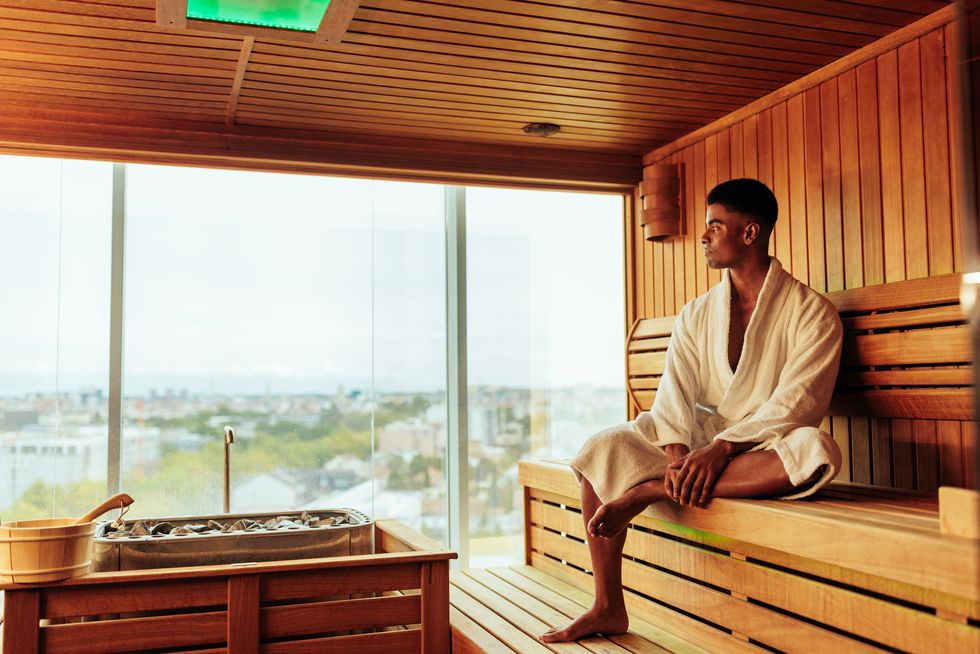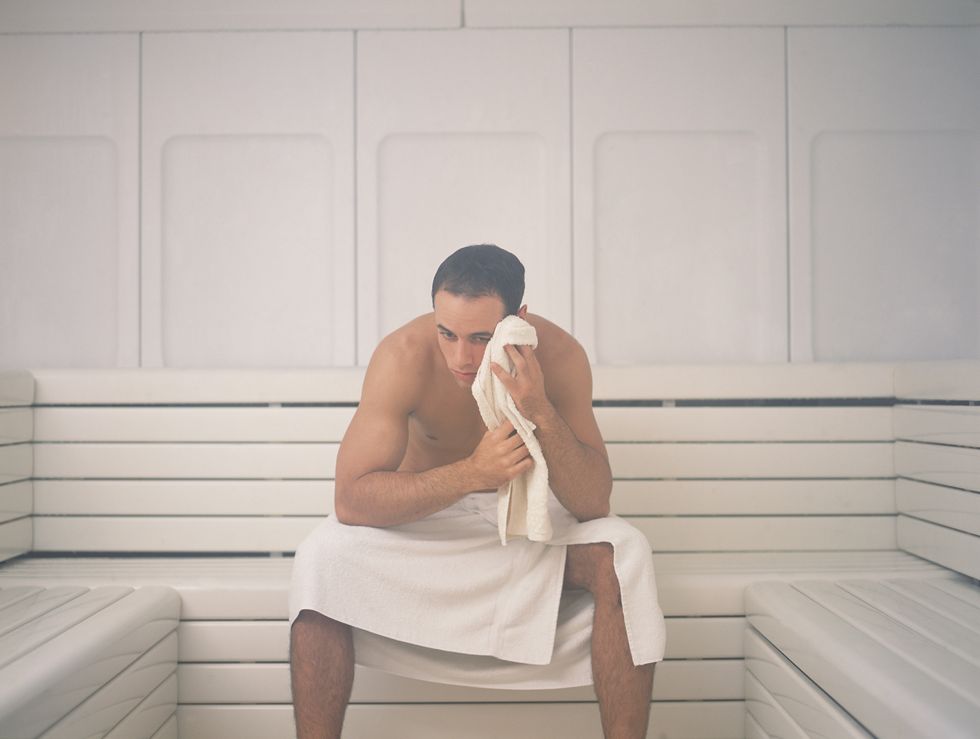AFTER A SWEATY WORKOUT, sitting in a hot, steamy room may seem like the last thing you’d want to do. But adding a sauna to your post-workout routine may offer benefits for your mind and body.
“It can be multiple types of heat—a sauna, hot tub, or another form of heat exposure— after training, and it just enhances the normal training responses you can get,” says Lance Dalleck, Ph.D., a professor of exercise and sport science at Western Colorado University and a member of the American Council on Exercise scientific advisory panel.
“When you adapt to heat, you get a lot of good benefits,” says Dalleck, who’s conducted research on the benefits of saunas and other heating strategies used after working out.
More From Men’s Health

Saunas are a big part of Scandinavian culture. They can feature heated rocks, steam, or infrared heaters, and are available at home, at spas, or at the gym. You can install an at-home sauna for about $100 to thousands of dollars, depending on what you choose. There are portable or built-in options.
Any type of sauna can offer health benefits, Dalleck says. To get the most out of it, he recommends using a sauna for about 15 to 20 minutes post-exercise and getting your core temperature to 101 to 102 degrees Fahrenheit. However, it is possible to get overheated and dehydrated if you use a sauna for too long.
Below, experts share some of the biggest benefits of a post-workout sauna for your mind and body—and, a few of the risks that you should know about.
Benefits of Hitting the Sauna
Ready to start your sauna journey? Take it slow in the beginning. Try it out a few times a week for a couple of months, and then increase your usage.
If you’re ready to take on the heat, here are 10 benefits of sauna use.
Enhances Training Responses
Exposure to heat, whether it’s a sauna or hot tub, after you work out can enhance the benefits of your training session, Dalleck says. According to research he co-authored, participants who wore a sauna suit or used hot water immersion post-exercise showed improvements in maximum oxygen uptake (the amount of oxygen your body uses while exercising) and lactate threshold, which refers to how capable someone is at maintaining high-intensity exercise over a prolonged period.
“Heat exposure adds the same benefits that you would get from doing more volume or more intensity of training, but without stress and pounding on your body,” Dalleck says.
Increases Cardiorespiratory Health
The physiological process that your body goes through to adapt to the heat from a sauna can lead to increased plasma volume, which gives you an increase in cardiorespiratory fitness, Dalleck says.
Cardiorespiratory fitness is your circulatory and respiratory systems’ capacity to supply oxygen to your muscles, heart, and lungs when you work out. A small study published in 2015 found that sauna bathing after normal training expanded plasma volume in cyclists after four sessions, but researchers were uncertain about the effects on their heart rate, and the study didn’t measure performance benefits.
“Improved cardiorespiratory fitness is most important in contributing to longevity and reduced risk of heart disease,” Dalleck says.
Lowers Your Risk for Diabetes
Heat exposure triggers the body’s heat shock proteins, which offers many benefits, including improving plasma volume. Another is that it helps regulate glucose.
“So exposure to the heat with sauna use can improve glucose regulation, and that can lower the risk of diabetes,” Dalleck says. Of course, it’s not the only thing you need to do to improve glucose regulation, but saunas did seem to have this effect.
Helps Preserve Muscle Mass
Saunas can potentially help you reach your fitness goals faster, says Samantha McKinney, R.D., a registered dietitian at the fitness company Life Time. A 2021 study on how saunas might extend “healthspan,” or the number of years you’re living with vitality, found that sauna use may actually help preserve muscle mass, as well as help guard against inflammation.
Boosts Heart Health
A sauna also may increase cardiovascular endurance, as it may lower your resting heart rate over time.
That said, time in the sauna isn’t exactly the same as a traditional sweat session in the gym. Because you’re not actually using your muscles the way you would be if you were working out, sauna use isn’t necessarily a standalone fitness benefit. However, used in conjunction with a workout plan, it’s possible you could find yourself being able to go harder for longer and recover more quickly than if you skipped the sauna.
Improves Skin Strength
Using a sauna may also be beneficial for healthy skin, although the specifics may be up to your skin type. The heat of the sauna can help you slough off dry skin cells more easily, and sweating can also lead to better circulation and enhanced collagen production.
Clears Your Pores
Sweating can help clear out your pores of bacteria and toxins, and might refresh your complexion.
But if you have a skin condition such as eczema or psoriasis, experts caution that the sauna may aggravate your skin. Speak to your dermatologist prior to using the sauna and stop if you notice any rashes or skin conditions develop. Since saunas can be moist, public saunas may be a breeding ground for bacteria and mold, which could cause potential skin conditions.
Helps You Relax
Hitting the sauna can also be a great way to decompress from the day, says McKinney, adding that many people like hitting the sauna in the evening as a way to unwind. It’s a calm space that gives you a chance to pause and meditate.
Boosts Brain Health
Using a sauna regularly has also been shown to offer health benefits to your brain and mind. Research published in 2019 shows that sauna use could also potentially reduce your risk for some mental health disorders. A 2020 study found that people that used saunas nine to 12 times a month showed a 53 percent lower chance of dementia over the next couple of decades than people who went zero to four times a month.
Eases Lower Back Pain
Heat in the form of a heat pack or bath is often touted as a tool for relief of muscle pain or soreness, so it makes sense that a sauna may have similar effects. In fact, a 2019 study showed that it can be an effective way to bring relief from lower back pain. The study authors recommend giving it a try for a couple of sessions to see if it actually helps lessen symptoms before regularly using it as part of your treatment plan.
Sauna Risks
Using a sauna can come with risks, especially if you’re doing it wrong or going too often. And, if you have any kind of chronic health condition, it’s best to talk to your doctor before trying out the sauna. Here are some of the biggest risks.
Dehydration
Because you’re sweating, you may be at risk for dehydration. That’s why it’s important to hydrate prior to hitting the sauna and refrain from alcohol. Or take water into the sauna with you.
“Before using the sauna, make sure you’re hydrated enough that your urine is a pale yellow,” McKinney says.
You need 12 to 16 ounces of fluids to rehydrate from your exercise session and to maintain hydration while you’re in the sauna, Dalleck says.
Or, use the sauna on your off days. If you do use it after exercise, McKinney adds that you can also add electrolyte powder or sip on an electrolyte drink prior to hopping in the sauna.
Dizziness
If you’re dizzy or lightheaded, that means it’s time to get out, says McKinney. Before you step into the sauna, it can also be a good idea to talk through your plans with your doctor, particularly if you have any preexisting conditions. One 2018 systematic review study found that sauna risks may include low blood pressure and airway irritation, among other potential health hazards.
Temporary Low Sperm Count
There may be reason to avoid frequent sauna visits if you’re trying to conceive: Some studies have found that sauna use may reduce sperm count, although the effect is temporary.
Blood Pressure Issues
If you’ve experienced low or high blood pressure or have had a heart attack, talk to your doctor before using a sauna. If you have low blood pressure and do get the OK, keep your sauna session on the short end. Be sure to stay hydrated while you’re in there, and get out if you start to feel lightheaded.
The same is true if you take blood pressure medication. It lowers your blood pressure and so does heat exposure, so the combined effect could put you at risk of passing out or getting lightheaded, Dalleck says.
Regardless of whether you hit the sauna at home, at the gym, or at a spa, using it post-workout may leave you feeling healthier, happier, and stronger.
Erica Sweeney is a writer who mostly covers health, wellness and careers. She has written for The New York Times, HuffPost, Teen Vogue, Parade, Money, Business Insider and many more.

Contributing Writer
Emilia Benton is a Houston-based freelance writer and editor. In addition to Runner’s World, she has contributed health, fitness and wellness content to Women’s Health, SELF, Prevention, Healthline, and the Houston Chronicle, among other publications. She is also an 11-time marathoner, a USATF Level 1-certified running coach, and an avid traveler.





Comments are closed.